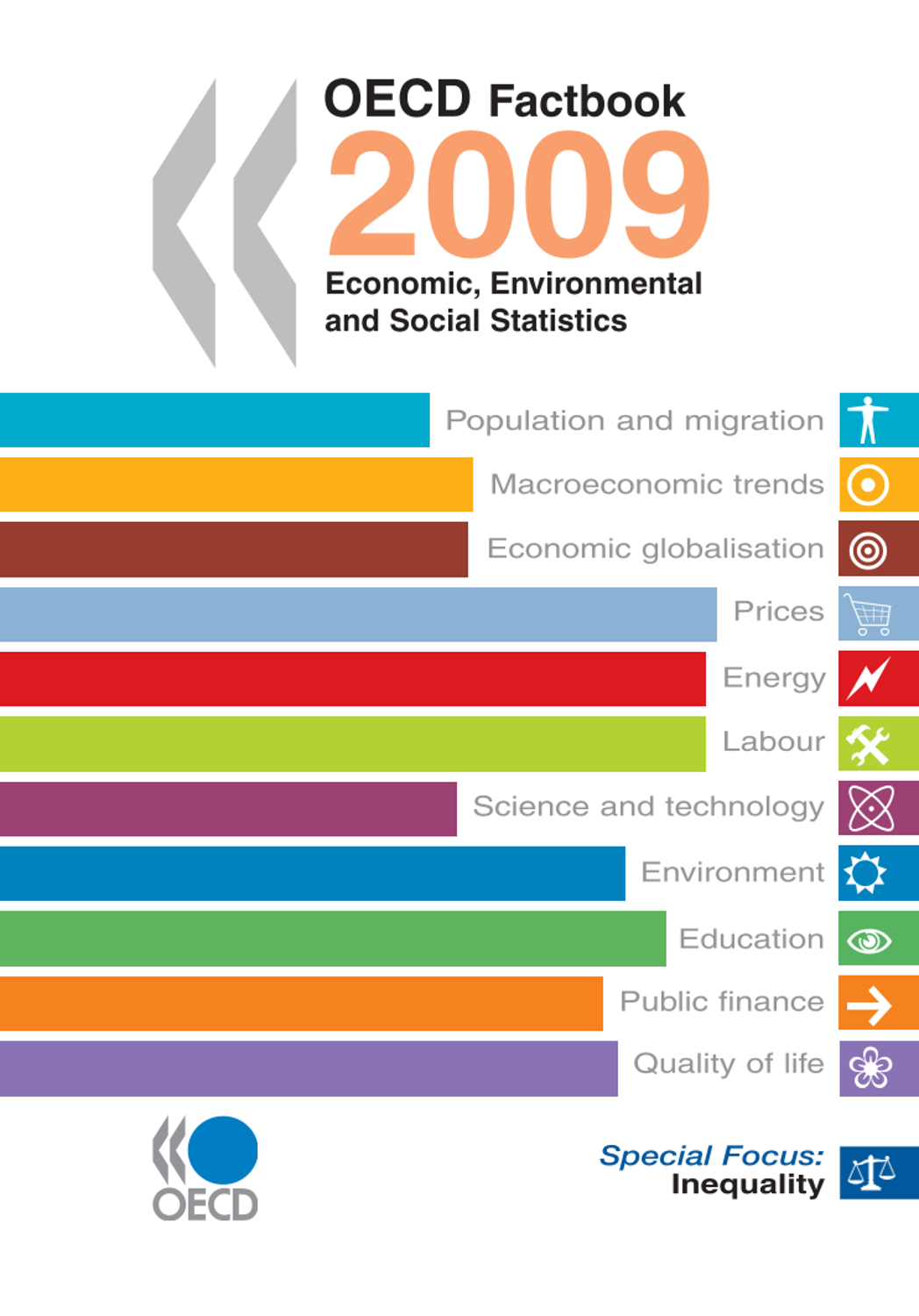
OECD보고서
OECD Factbook 2009: Economic, Environmental and Social Statistics
- 저자
- OECD
- 발행사항
- Paris : OECD, 2009
- 형태사항
- 313p. ; 27cm
- 서지주기
- 색인수록
소장정보
| 위치 | 등록번호 | 청구기호 / 출력 | 상태 | 반납예정일 |
|---|---|---|---|---|
이용 가능 (1) | ||||
| 자료실 | E203626 | 대출가능 | - | |
이용 가능 (1)
- 등록번호
- E203626
- 상태/반납예정일
- 대출가능
- -
- 위치/청구기호(출력)
- 자료실
책 소개
OECD Factbook 2009 is the fifth edition of a comprehensive and dynamic statistical annual from the OECD. More than 100 indicators cover a wide range of areas: economy, agriculture, education, energy, environment, foreign aid, health and quality of life, industry, information and communications, population/labour force, trade and investment, taxation, public expenditure and R&D. This year, the OECD Factbook features a focus chapter on inequality. Data are provided for all OECD member countries with area totals, and in some cases, for selected non-member economies.
For each indicator, there is a two-page spread. A text page includes a short introduction followed by a detailed definition of the indicator, comments on comparability of the data, an assessment of long-term trends related to the indicator, and a list of references for further information on the indicator. The next page contains a table and a graph providing - at a glance - the key message conveyed by the data. A dynamic link (StatLink) is provided for each table directing the user to a web page where the corresponding data are available in ExcelA® format.
OECD Factbook 2009 is a key reference tool for everyone working on economic and policy issues.
목차
Table of contents:
Population and Migration
-Evolution of the population
-Regional population
-Ageing societies
-Elderly population by region
-Public and private pension expenditures
-Trends in migration
-Immigrant population
-Migration and employment by educational attainment
-Migration and unemployment
Macroeconomic Trends
-Size of GDP
-National income per capita
-Evolution of GDP
-Household saving
-Investment rates
-Inflation
-Steel production
-Income and productivity levels
-Growth in GDP per capita
-Labour productivity growth
-Growth accounts for OECD countries
-Value added by activity
-Evolution of value added by activity
-Small and medium sized enterprises
Economic Globalisation
-Share of trade in GDP
-Trade in goods
-Trade in services
-Trading partners
-Balance of payments
-FDI flows and stocks
-Activities of multinationals
Prices
-Consumer price indices
-Producer prices indices
-Long-term interest rates
-Purchasing power parities and exchange rates
-Effective exchange rates
Energy
-Primary energy supply
-Energy supply and economic growth
-Energy supply per capita
-Electricity generation
-Nuclear energy
-Renewable energy
-Energy production
-Oil production
-Oil prices
Labour
-Employment rates by gender
-Employment rates by age group
-Part-time employment
-Self-employment
-Unemployment rates
-Long-term unemployment
-Regional unemployment
-Labour compensation
-Hours worked
Science and Technology
-Expenditure on R&D
-Investment in Knowledge
-Researchers
-Patents
-Size of the ICT sector
-Investment in ICT
-Occupation and skills in the infomration economy
-Computer and internet access by households
-Exports of information and communications equipment
-Telephone access
Environment
-Water consumption
-Fisheries
-Emissions of Carbon Dioxide
-Municipal waste
Education
-International student assessment
-Trends in tertiary education
-Tertiary attainment
-Change in expenditure on education
-Relative earnings of graduates
-Public and private expenditure in tertiary education
-Expenditure on educational institutions
Public Finance
-Government deficits
-Government debt
-Health expenditure
-Social expenditure
-Law, order, and defence expenditure
-Agricultural support estimates
-Government support for fishing
-Official development assistance
-Total tax revenue
-Taxes on the average worker
Quality of Life
-Life expectancy
-Infant mortality
-Mental health
-Obesity
-Suicide
-Subjective well-being
-Volunteering and social support
-Leisure time
-Youth inactivity
-Leisure time
-Recreation and culture
-Tourism: hotel nights
-Victimisation rates
-Road fatalities
Special Focus: Inequality
-Measures of income inequality
-Incomes at different points of the distribution
-Poverty rates and poverty gaps
-Poverty by individual and household characteristics
-Public benefits, taxes, and income inequality
-Public benefits, taxes, and income poverty
-Reading proficiency of 15-year-old students
-Educational performance of 15-year-olds by immigrant status
-Participation in higher education by father's job and education
-Health status
-Access and use of heatlh care
-Regional GDP
-Regional labour markets
-Regional access to education and health services
